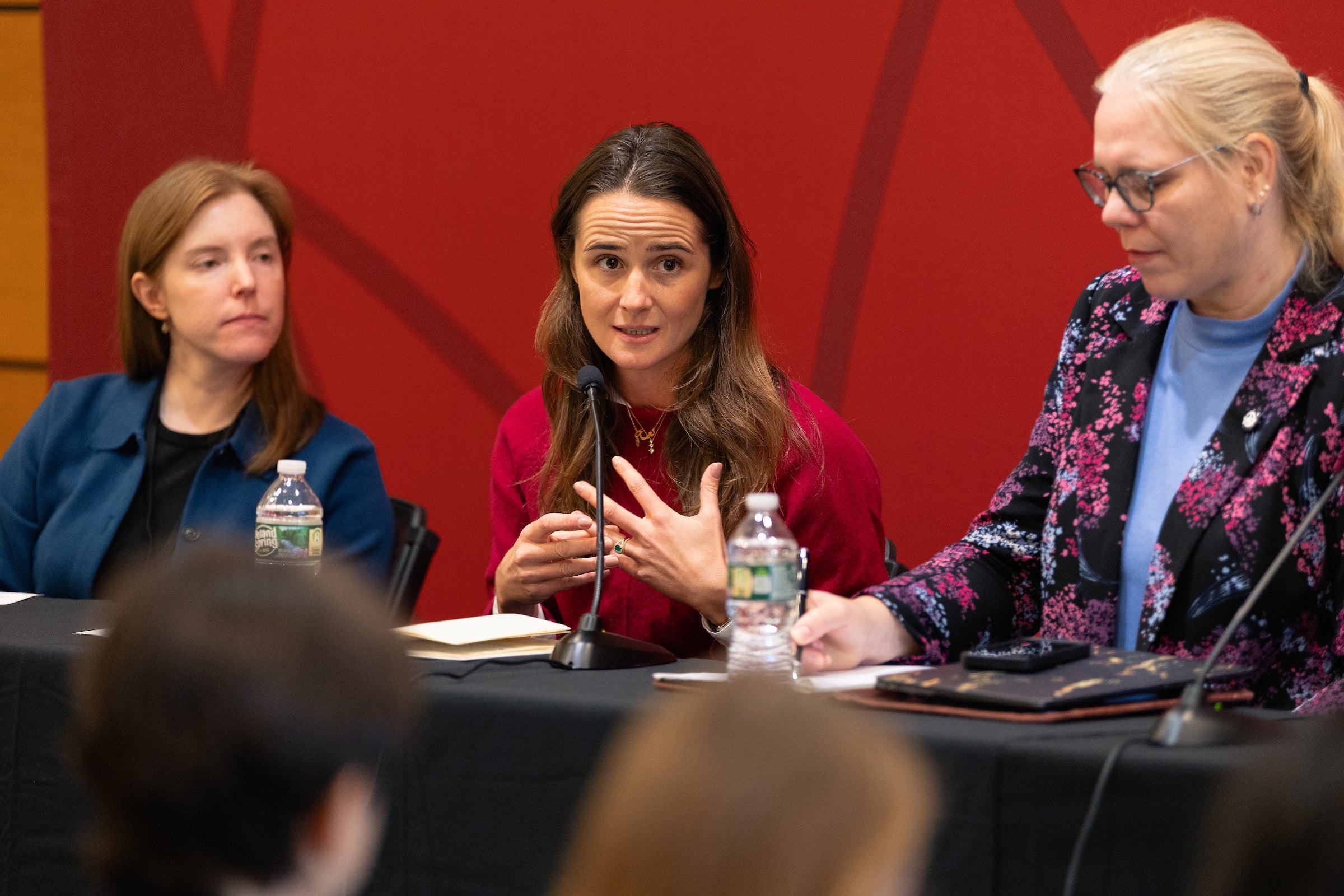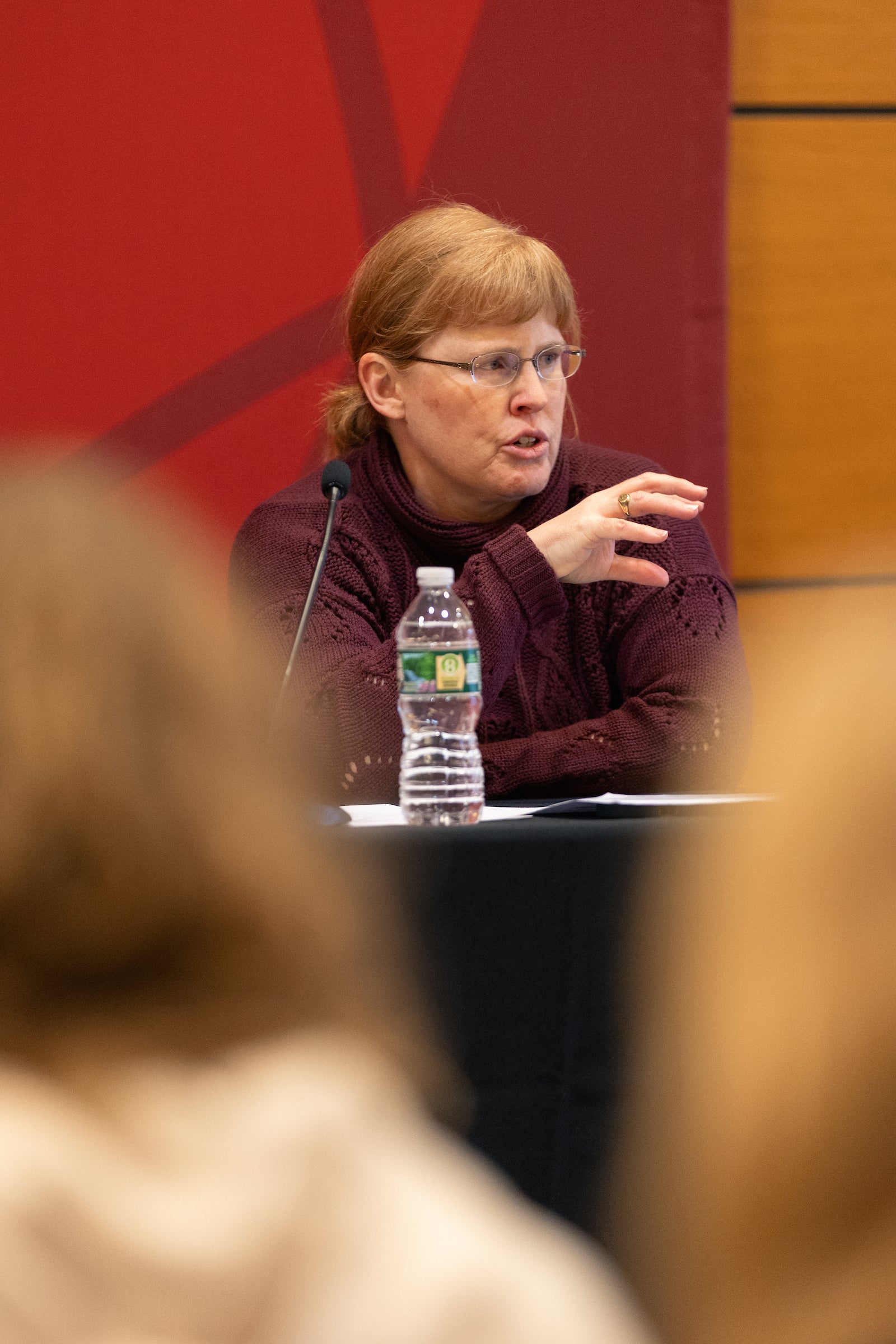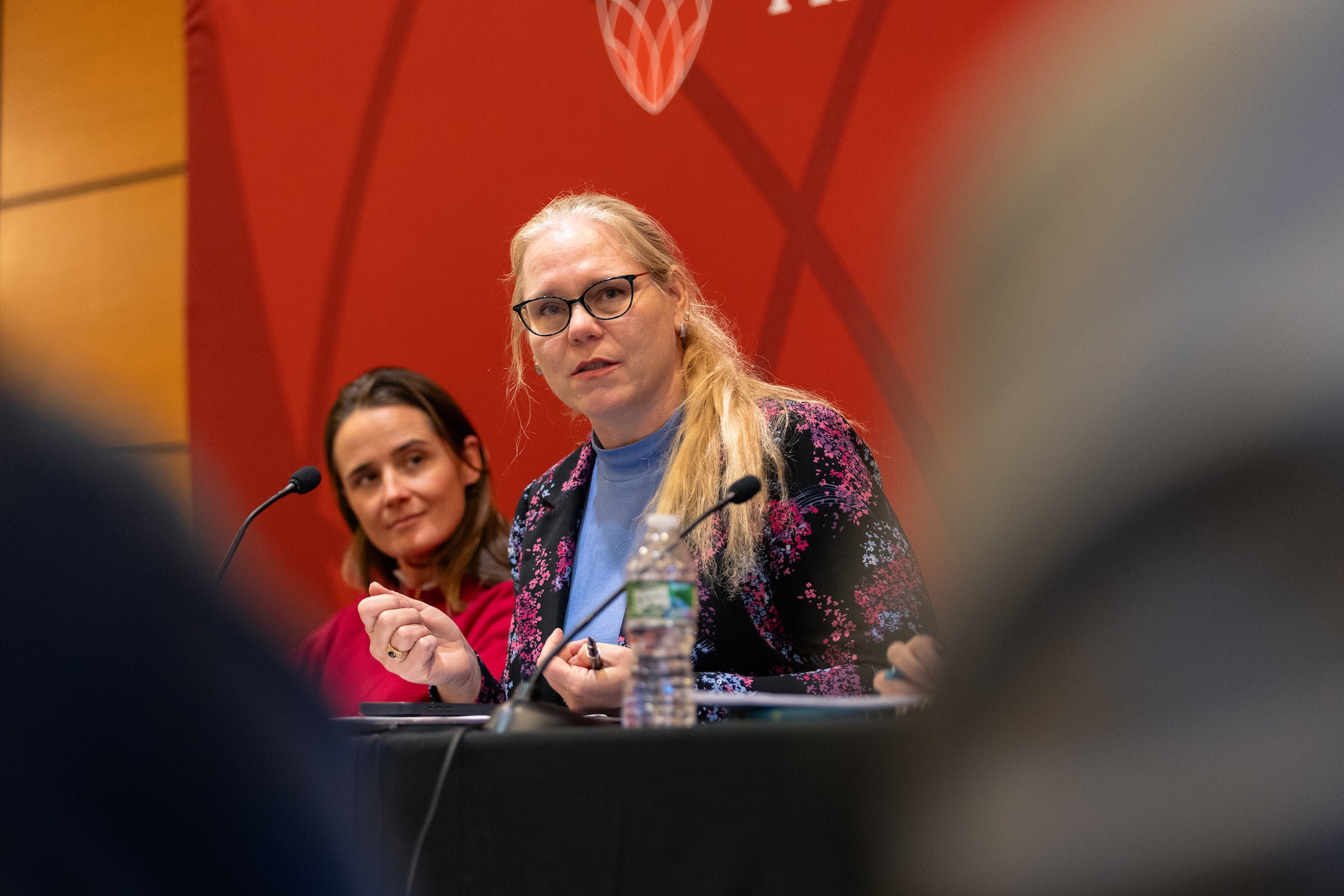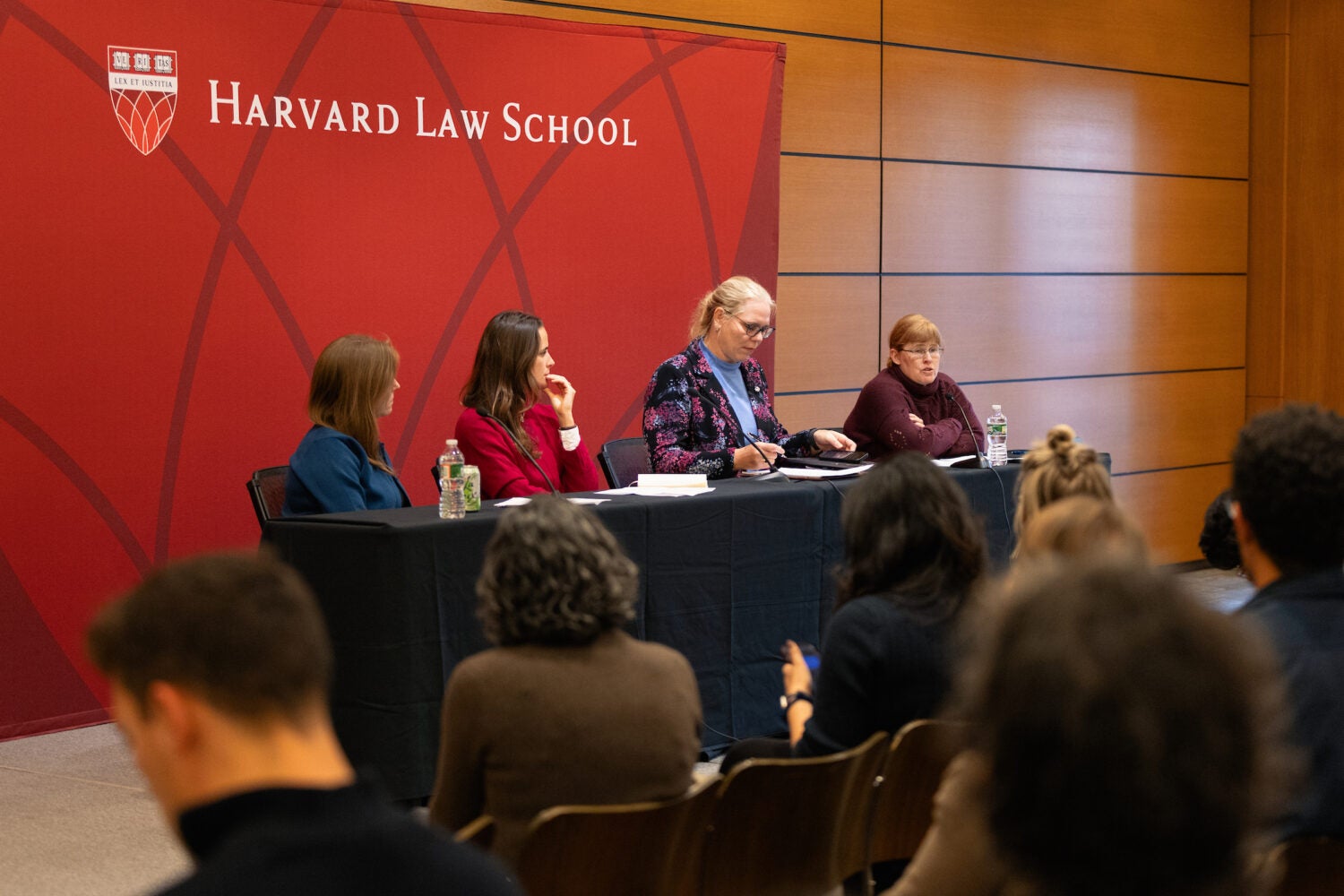With armed conflicts and humanitarian crises raging globally, some critics have little confidence in the ability of the international legal system to rein in antagonistic states and actors.
Nevertheless, international law in general and international humanitarian law in particular remain the best possible deterrents to rogue behavior, according to several speakers at a timely, ripped-from-the-headlines event sponsored by Harvard Law School’s International Human Rights Clinic.
“It works,” said Federica du Pasquier, a senior advisor at the philanthropic fund Lex International who has worked in conflict zones in several countries. “It’s the best system we’ve found to regulate the way that different states with very different interests can cohabitate on the one small, heating planet that we’re on.”
As an example, du Pasquier pointed to the Anti-Personnel Mine Ban Treaty, which took effect in 1999. Since its implementation, casualties from land mines have decreased by 96% in Cambodia and 91% in Colombia, she said.
“We have seen actors change their behavior because they feel bound by the law,” she said. “Every time the ICRC [International Committee of the Red Cross] is allowed to visit prisoners of war, that’s respect for IHL [international humanitarian law].”
The Nov. 4 panel discussion at Harvard Law School, “Firebombings and Fallout: Why International Law Still Matters,” was moderated by Anna Crowe LL.M. ’12, associate director of the International Human Rights Clinic. In addition to du Pasquier, panelists were Bonnie Docherty ’01, director of the clinic’s Armed Conflict and Civilian Protection Initiative, and Susi Snyder, director of programs at the International Campaign to Abolish Nuclear Weapons (ICAN). Docherty, Snyder, and Crowe all helped negotiate the 2017 Treaty on the Prohibition of Nuclear Weapons, which nearly 100 countries, mostly in the Global South, have signed.

“When people push me too much on effectiveness, I’m really tempted to ask: How effective is the alternative? How effective is military action as the alternative to the system of rules that we agree to?”
Federica du Pasquier
“International law works because it’s helped create the stability that has underpinned decades of economic development,” du Pasquier said. “It’s helped us make tremendous gains on security … on reducing casualties, on reducing wars and therefore allowing us to spend more money doing other things. … When people push me too much on effectiveness, I’m really tempted to ask: How effective is the alternative? How effective is military action as the alternative to the system of rules that we agree to?”
The event came as the world marks 80 years since the United States and Great Britain used incendiary and nuclear weapons to help end World War II, and in the wake of recent comments by President Trump that the United States would resume nuclear testing after more than three decades. No country except North Korea has tested nuclear weapons since the Comprehensive Nuclear-Test-Ban Treaty was opened for signature in 1996. That treaty has never formally taken effect because not enough countries have ratified it, but it has helped create “a strong global norm” against testing and proliferation, according to its website.
“Within just the last week, we heard some alarming news that … the president has decided that the United States should resume nuclear testing,” Crowe said at the start of the discussion. “For many of us in the disarmament world, this announcement comes as a shock and a huge disappointment, and it comes off the back of a number of alarming developments in the field.”

International law faces enormous challenges, the panelists agreed, not just in the context of armed conflict but also in other areas, such as trade. du Pasquier mentioned President Trump’s new tariff policies, which are being challenged in court. Docherty cited recent examples of countries violating international humanitarian law, including the use of land mines and cluster munitions by Russia and Ukraine, and the use of incendiary weapons by Sudan and Israel. She also pointed out that some countries are withdrawing from treaties they previously agreed to, ostensibly to further their own self-defense.
“It also suggests that it’s acceptable to renege on their international humanitarian law obligations when facing times of war, which is exactly the time when such laws are needed,” she said. “They’re designed to protect civilians during times of war, and that’s when we really need to home in on protecting them.”
Still, international law remains a forum where countries can meet to discuss complex problems together. du Pasquier pointed to an ongoing effort by the International Committee of the Red Cross — led by Brazil, China, France, Jordan, Kazakhstan, and South Africa — to renew countries’ commitments to international humanitarian law. So far, more than 90 countries have signed on.
“International law protects the rights of the weakest — those who are perceived as weak,” Synder said. “We decide what is normal; we set the norms … and international law gives us the framework in which to do so. … [Institutions built by international law] create a meeting place that is necessary both for like-mindeds but also to challenge those with whom we disagree in a safe space to do so, [and] to find negotiated agreements.”

“[Institutions built by international law] create a meeting place that is necessary both for like-mindeds but also to challenge those with whom we disagree in a safe space to do so, [and] to find negotiated agreements.”
Susi Snyder
The panelists took questions from the audience, including about how economics tools such as sanctions fit into the broader context of conflict resolution.
Snyder, who manages ICAN’s divestment and work with the financial sector, said sanctions can play a major role.
“Power is not in guns and tanks and bombers,” she said. “Power is in who has capital, who has control over access to resources.”
The panelists emphasized the pivotal role that international law can play in protecting people and the planet and encouraged students to be part of that process.
“In this moment in the United States, lots of people are waking up to the fact that law is contingent on lots of different things in the domestic sphere as well as in the international sphere,” Crowe said. But “crisis can be a space for opportunity as well. We’re seeing all the pieces in flux at the moment, and we need to see ourselves as actors who have some influence and autonomy … as to where the pieces land.”
Want to stay up to date with Harvard Law Today? Sign up for our weekly newsletter.
